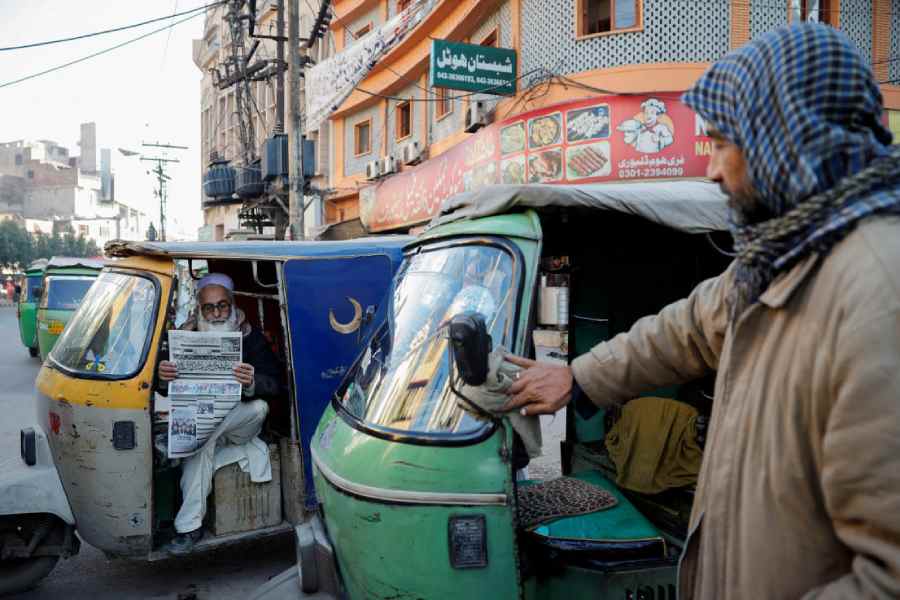Two countries, two elections, two qualitatively different media discourses.
How different the election buzz can feel in India and in Pakistan. Here, you were not allowed to forget for a moment that the elections are imminent even when they were several months away. But a few days away from polling day in Pakistan, television panels were discussing why candidates were not out asking people for votes, why the excitement of an election was totally missing and mayusi (feeling downcast), instead, was palpable. Voters told journalists there was no “garma garmi”, no personal engagement with party candidates, on this occasion. One commentator said that he had sampled voters while travelling and 78% had said that nobody had come to their homes to ask for votes. They wondered whether the elections would take place.
The TV studio sneering about “election ya selection” spoke of a pervasive cynicism in a country where elections are assumed to be rigged. There were casual references to a dictatorship with a TV anchor asking, “Are you talking of the military dictatorship or the civilian dictatorship?” The physicist-author, Pervez Hoodbhoy, was explaining in a Substack comment why boycotting rigged elections is not the answer because in Pakistan rigged elections are a fact of life. This is not a discourse we routinely encounter here.
Nobody mentions Pakistan while talking of elections in India. But nobody fails to mention India while moderating or commenting on an election discussion in Pakistan. There is resigned envy about the economy, about the nationalism which India’s ruling party promotes, about the functioning of the Election Commission, and about what “woh banda Modi” is achieving for his people.
It’s a strange country where the United Nations Development Programme comes in to produce catchy election jingles ahead of the polls to motivate Pakistan’s youth to vote. The video was among several UNDP engagements in the country, including the training of presiding and returning officers at polling booths. In the 2019 elections in India, it was the Election Commission which performed that role and commissioned jingles urging people to vote.
Pakistan’s media environment has been intermittently repressive. Last August, the Pakistan Electronic Media Regulatory Authority had issued a directive banning coverage of 11 persons critical of the military and of previous governments. It cited a Sindh High Court decision to say they could not appear on television. They were declared proclaimed offenders on electronic media. A year earlier, in August 2022, the ARY channel had been temporarily blocked by the Shabaz Sharif government.
This time, in what is being described as the biggest and most expensive election in the country’s history, with 128 million registered voters, mobile internet services were shut down just before voting began. Dawn reported that multiple regions of the country also saw internet blackouts. It was a sudden decision that nobody had planned for and an incredible roadblock for journalists. How do you collect information and disseminate the post-balloting results? TV reporters were totally flummoxed; it affected their ability to give live updates.
But eventually, the election itself yielded an amazing story. A tenacious electorate gave the majority seats to a party that was denied a unified election symbol. The Pakistan Tehreek-e-Insaf won 93 seats after the candidates it backed were forced to run as independents. Voters had to memorise symbols of independent local candidates if they wanted to vote for the PTI, but did so nevertheless.
Given the Indian ruling party’s allergy to an independent-minded media, journalists here began coming together to organise legal protection for themselves a couple of years ago with the formation of organisations such as DigiPub. Now, Pakistan’s media associations have decided to form a coalition to fight against increasing restrictions on free speech. The ‘Coalition for Free Media’ was formed in Islamabad last month, bringing together almost all groups and factions affiliated with media professionals. An editorial in Dawn stated that the coalition hoped to wrest back some of the independence the Pakistani media has been gradually deprived of over the last decade. In a country with an unstable polity and frequent changes in government, journalists’ attempts to assert their freedoms have cost them dearly, the paper said. Across South Asia, Pakistani media is considered the most courageous, up against a powerful military establishment, accustomed to bouts of dictatorship and unstable governments. The coalition has demanded the implementation of the Protection of Journalists and Media Professionals Act that Pakistan has but which protects them from precious little. Journalists face unresolved murders, gun-battles, and abductions.
It is noteworthy how stable as well as unstable governments display comparable insecurity in dealing with the media in their countries. At one level, the political and economic stability in India is the envy of Pakistani journalists whose TV discussions in the run-up to voting were peppered with comparative references to India and Narendra Modi. But at another level, a strong government with no use for media freedom throws more roadblocks in the way of press freedom than a weak one does. Revamping existing laws every few months and making the rules more oppressive has been one way for the Indian government to close in on the media’s freedom to function.
Earlier this month, the Indian government used Section 69A of the IT Act to take down a long, painstakingly documented story of army torture of civilians in Poonch in The Caravan. The magazine complied with the order while saying that it would challenge it. In the same month, the Indian government withdrew a French correspondent’s OCI card, citing displeasure with her reporting. It is forcing her to leave the country despite having a son and husband here if she wants to continue being a journalist.
Ironically, India now ranks 11 places below Pakistan in the RSF press freedom index at 161 among 180 countries. In 2023, Pakistan moved up seven places to 150, while India dropped 11 places. Cold comfort for our beleaguered neighbour.
Sevanti Ninan is a media commentator and was the founder-editor of TheHoot.org










